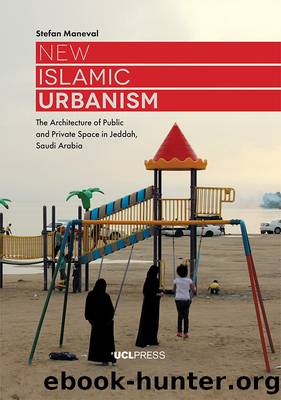New Islamic Urbanism by Stefan Maneval

Author:Stefan Maneval [Maneval, Stefan]
Language: eng
Format: epub
Tags: Social Science, Anthropology, Cultural & Social, Architecture, General, Religion, Islam, Rituals & Practice, Buildings, Residential, Political Science, Public Policy, City Planning & Urban Development
ISBN: 9781787356429
Google: ahvLDwAAQBAJ
Publisher: UCL Press
Published: 2019-12-04T05:15:18+00:00
Islamic Revival
Conservative Muslim scholars, preachers and Islamic activists from the 1970s to the 1990s popularised a cultural climate demanding a return to the moral concepts of an idealised past, to the teachings of pious forefathers (al-salaf al-á¹£Äliḥ). The most radical expression of Islamic criticism occurred in 1979, when a few hundred religious extremists led by JuhaimÄn al-Ê¿UtaibÄ« occupied the Grand Mosque in Mecca in order to draw attention to their discontent with the Saudi government. They viewed the ruling family as corrupt and oppressive and condemned it for cooperating with the United States. After three weeks, the occupation was ended by the Saudi authorities, causing bloodshed and killing within the sanctuary (Dekmejian 1994; Doumato 1992; Ochsenwald 1981; Okruhlik 2002).
While the radical activism of JuhaimÄn al-Ê¿UtaibÄ« was observed sceptically by the majority of Saudis, a movement known as al-á¹£aḥwa al-islÄmiyya, Islamic awakening, grew quite strong. The advocates of this movement, known as shuyÅ«kh al-á¹£aḥwa, were religious scholars and eloquent preachers who disseminated their criticism of the Saudi government, of Western-style consumption and an alleged weakening of moral standards in books, pamphlets and tape-recorded sermons. Their writings and cassette sermons were circulated, copied and embraced by large parts of Saudi society. The á¹£aḥwa had been active throughout the 1980s, but it was against the background of the Gulf War in 1990â1 that they rose to prominence. Responding to the Iraqi invasion of Kuwait and fearing that Saddam Hussein might attack the Kingdom, the Saudi government called on the United States to station troops in the country in August 1990. The presence of a non-Muslim army inside the Land of the Two Holy Shrines (al-ḥaramayn, i.e. Mecca and Medina), as well as the fact that the Saudi regime had to rely on foreign forces to protect the country, generated widespread discontent. Safar al-ḤawÄlÄ« and SalmÄn al-Ê¿Awda, the two eminent leaders of the á¹£aḥwa, won public acclaim for openly criticising the policy of the Äl SaÊ¿Å«d (see Fandy 1999a: chapters 2 and 3; Jones 2003; Lacroix 2011; Teitelbaum 2000). In a taped lecture from 1991, sheikh Safar al-ḤawÄlÄ« claimed:
It is not the world against Iraq. It is the West against Islam.⦠[I]f Iraq has occupied Kuwait, then America has occupied Saudi Arabia. The real enemy is not Iraq. It is the West.⦠While Iraq was the enemy of the hour, America and the West were the enemies of Judgment Day.
(al-ḤawÄlÄ« quoted in Teitelbaum 2000: 30)
Download
This site does not store any files on its server. We only index and link to content provided by other sites. Please contact the content providers to delete copyright contents if any and email us, we'll remove relevant links or contents immediately.
Kathy Andrews Collection by Kathy Andrews(11835)
The remains of the day by Kazuo Ishiguro(9000)
Spare by Prince Harry The Duke of Sussex(5197)
Paper Towns by Green John(5191)
The Body: A Guide for Occupants by Bill Bryson(5098)
Industrial Automation from Scratch: A hands-on guide to using sensors, actuators, PLCs, HMIs, and SCADA to automate industrial processes by Olushola Akande(5061)
Machine Learning at Scale with H2O by Gregory Keys | David Whiting(4313)
Be in a Treehouse by Pete Nelson(4052)
Never by Ken Follett(3957)
Harry Potter and the Goblet Of Fire by J.K. Rowling(3859)
Goodbye Paradise(3811)
The Remains of the Day by Kazuo Ishiguro(3413)
Into Thin Air by Jon Krakauer(3400)
Fairy Tale by Stephen King(3399)
The Cellar by Natasha Preston(3346)
The Genius of Japanese Carpentry by Azby Brown(3309)
120 Days of Sodom by Marquis de Sade(3275)
Reminders of Him: A Novel by Colleen Hoover(3121)
Drawing Shortcuts: Developing Quick Drawing Skills Using Today's Technology by Leggitt Jim(3083)
